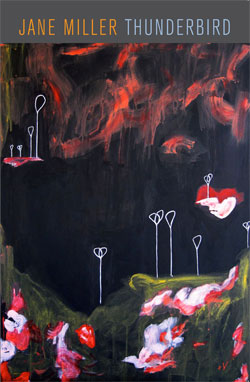Thunderbird
by Jane Miller
Copper Canyon Press, $16 (paper)
 Jane Miller’s work has long been remarkable for its ability to waterfall a voice over multiple lines of enjambment. In the classical Greco-Roman sense, her poems have delivery. Her poetic voice knows how to continue, using a nonstop single-breath narrative, even through sci-fi shifts in time and space. In Thunderbird, her tenth book of poems, this voice is more elliptical, less soliloquy than sudden visitation. The voice speaks but does not stay to keep us company. It is often a wry voice, as in this poem imagining Lorca making a joke from the grave: “you think the friction between you / is blazing hot and not just // death’s genitals / which are a part of nature.” Expansiveness results not from talkativeness but from resonance. Miller rooms with silence: pitch-dark poems reference sleep both daily and perpetual against the book’s backdrop of grief for deceased parents. She combines short poems (some between three and seven lines) on a page, causing a new type of flow. These multiple openings and closures occurring on a single page are suggestive of hope and the ability to continue in the face of grief. Careful sound effects also contribute to the sense of continuance; similar sounds such as “fleeing” and “feeling” at the end of one poem become “fleeting figure” at the opening of the next. The result is a set of poems simultaneously flashy and nocturnal.
Jane Miller’s work has long been remarkable for its ability to waterfall a voice over multiple lines of enjambment. In the classical Greco-Roman sense, her poems have delivery. Her poetic voice knows how to continue, using a nonstop single-breath narrative, even through sci-fi shifts in time and space. In Thunderbird, her tenth book of poems, this voice is more elliptical, less soliloquy than sudden visitation. The voice speaks but does not stay to keep us company. It is often a wry voice, as in this poem imagining Lorca making a joke from the grave: “you think the friction between you / is blazing hot and not just // death’s genitals / which are a part of nature.” Expansiveness results not from talkativeness but from resonance. Miller rooms with silence: pitch-dark poems reference sleep both daily and perpetual against the book’s backdrop of grief for deceased parents. She combines short poems (some between three and seven lines) on a page, causing a new type of flow. These multiple openings and closures occurring on a single page are suggestive of hope and the ability to continue in the face of grief. Careful sound effects also contribute to the sense of continuance; similar sounds such as “fleeing” and “feeling” at the end of one poem become “fleeting figure” at the opening of the next. The result is a set of poems simultaneously flashy and nocturnal.







